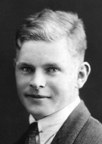 |
|
|
|
Non Nascor Mihi Solum |
Henry Francis Hall - 30 March 1905 - 12 December 1980 | |
 Henry
went to Newcastle Royal Grammar School, the last of the six boys to
go there for primary education. In 1918 he went to Bromsgrove School.
The two brothers who preceded him there helped pay the fees, and he
matriculated in two years. Henry was very scientific and particularly
good at mathematics. He also discovered a great skill with his hands
in carving and other such crafts. After Bromsgrove there was not much
for him to be able to do. His parents did not know how to finance
further education. The father of Henry's best friend at Bromsgrove
was a wealthy tool manufacturer in Birmingham. He was particularly
fond of Henry, and so agreed to give both the boys an apprenticeship
in engineering. Unfortunately the plan fell through because the company
was affected by the slump and went bankrupt. Henry
went to Newcastle Royal Grammar School, the last of the six boys to
go there for primary education. In 1918 he went to Bromsgrove School.
The two brothers who preceded him there helped pay the fees, and he
matriculated in two years. Henry was very scientific and particularly
good at mathematics. He also discovered a great skill with his hands
in carving and other such crafts. After Bromsgrove there was not much
for him to be able to do. His parents did not know how to finance
further education. The father of Henry's best friend at Bromsgrove
was a wealthy tool manufacturer in Birmingham. He was particularly
fond of Henry, and so agreed to give both the boys an apprenticeship
in engineering. Unfortunately the plan fell through because the company
was affected by the slump and went bankrupt.
Henry managed to acquire a few jobs, one as a junior apprentice in a small company, and another sending Morse code messages all over the far east for the London Eastern Telegraph Company.Henry was too intelligent for these jobs, and what education he had had was not stretched to its full ability. Henry saw an advert for the Public Schoolboys emigration scheme which was for poor boys with a good education and background. It offered them a chance to work in the colonies. Henry applied for a place with great hope. The travel fare was heavily subsidised, but the travelling conditions were very bad. He arrived in New Zealand with just £5, knowing that he was to go to a Mr Berryman of Nelson, a well-known sheep and cattle farmer; he was not well treated there. Later he applied for a vacancy advertised by Henry Lissaman, who gave him the job. He married his daughter Elizabeth Lissaman on 20 August 1930. He went into a partnership with Frank Lissaman, Elizabeth's uncle, cropping and grazing the 600 acres of Alton Downs, Seddon. but his senior partner defrauded him leaving him penniless. Henry and Betty then took on a piece of land at Canvastown between Havelock and Nelson. Their first son, Ronald Berners [named after the two uncles who had helped his father at Bromsgrove] was born in 1931, and Michael in 1933 - both might thus be said to have been born in a tent ! The first year's income was NZŁ19; Betty made more from her pottery. After the death of Henry's mother in 1936, they were able to buy 266 acres at Levin on the North Island. Betty made all the crockery for around the house, and Henry made all the furniture. They were almost self-sufficient. Bligh was born in 1937. On their new plot of land they took up sheep. From then on things went upwards. Henry went into breeding. He had a stud flock and produced very good ewes and lambs. He could now afford to move to Morrinsville to a farm which he called Harpsden after the Oxfordshire estate. He won gold medals for his fine rams in the Royal Show. Michael imported a polled Dorset ram from Tasmania and developed the breed of Poll Dorsets and was recognised as one of New Zealand's top breeders. Henry returned to England for the first time since 1924 for a family reunion in 1958. He returned once more in 1961 with the thought that he had a mechanism to make his fortune. Unfortunately this failed, and from then on this health grew worse. He suffered from a sort of mental breakdown, maybe caused by the frustration of immobility caused by his varicose veins - a family failing. The farming agent said to him that he was the most trusted farmer in New Zealand and would never let anyone down. He died in 1980 moderately young from a hard demanding life, but which he had spent with his family. Henry had been a well respected man, in addition to his wonderful farming and breeding skills. Elizabeth was awarded the OBE for her pottery. |
||